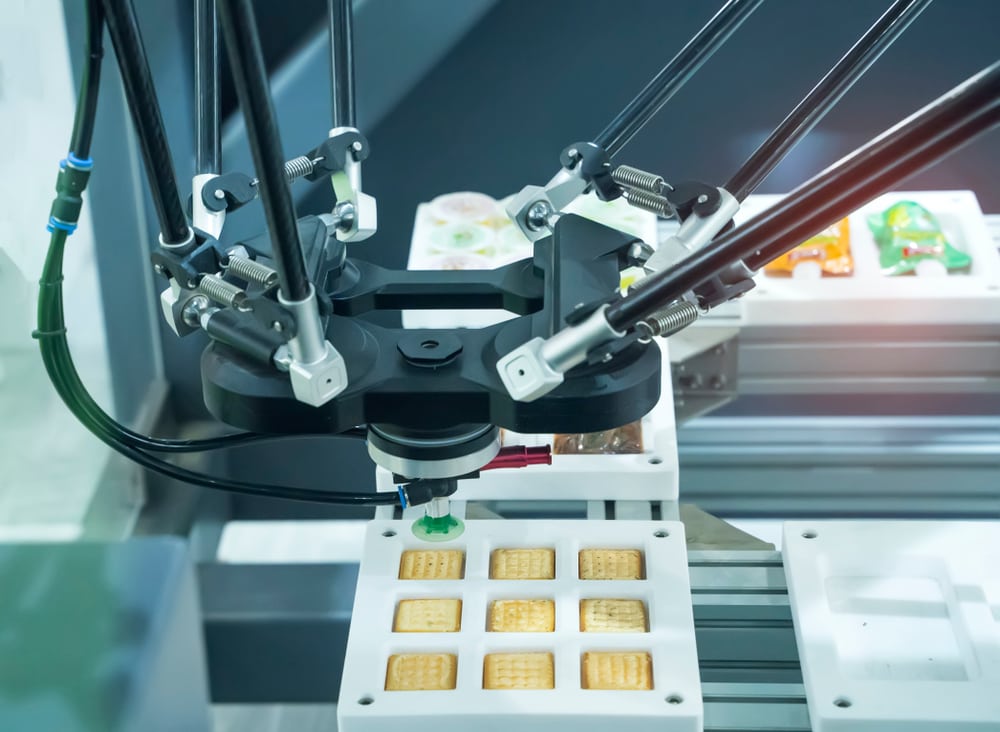News & Blog

How Robotics Are Used In The Food Industry
Robotics and the food industry go hand in hand. The use of robotics has advanced the food industry dramatically over the past couple of decades and in so many ways! Using automated systems, farmers and food manufacturers have been improving efficiency, productivity, cleanliness and safety.
Robotics in the food production industry are commonly utilised for distribution, feed placement, piecing, packaging, pick-and-placing products into vessels and filing. The capabilities of automated systems seem endless, there’s no wonder why so many industries are now adopting a robot workforce into their processes.
Robots Can Work in Dangerous Environments
Firstly, robots can work in dangerous environments that are unsafe for humans. For instance; lettuce weeding can pose a danger to field workers, due to the pesticides they carry and spray. Modern automated systems in agriculture can use vision systems to effectively farm the lettuce, with the ability to distinguish between pests and produce.
Automated Systems Operate with High Levels of Accuracy
The consistent accuracy and precision of automated systems substantially decrease the number of errors, waste and unnecessary costs. According to the Robotics Industries Association - Pick and place robots, commonly used in food packaging, can handle a staggering 200 items per minute. Whilst vision systems can effectively identify 100 items per second.
Robotic Workforces Are Efficient
Robots can work around the clock with no need for breaks, paid time off or rest. They are great at handling monotonous tasks such as checking crops in a row for disease or pests, or organising thousands of food items on a conveyor belt. Some manufacturers have incorporated fully automated systems, capable of operating continuously in what’s known as ‘lights out’ manufacturing - meaning the manufacturing process can operate without any human interaction.
The Types of Robots Used Today
There are many types of robot currently used within the food industry, some include; dispensing robots, pick and place robots, palletizing robots, sorting robots, order-picking robots and cleanroom robots to name a few. RoboMotion is a company specialising in the integration of robot workforces for a range of industries, capable of installing systems with complex needs such as; cutting, drilling, glueing, packing, painting, picking, placing, printing, sorting, trimming and welding to name just a few.
Dispensing robots refer to automated systems capable of pouring liquids, dispensing small items like tablets, grains or garnishes and filling containers with accurate portions. Dispensing robots utilise end of arm tooling (EOAT) systems.
Delta robots can very quickly sort small objects. Their lightweight arms and hanging design allow the delta robots to pick and place small items such as computer chips, very quickly and with high precision.
Pick and place robots do just as their name suggests. They are able to pick up and place objects with precision. Pick and place robots are very diverse as there are many end of arm tooling options available, some include;
- Magnetised gripping systems - for lifting steel products, commonly used with palletizing robots which attribute to the storing and unpacking parts, cases or other objects to or from pallets.
- Suction grippers that can lift very heavy, hard materials. These are also commonly used with palletizing robots
- Claw grippers are able to pick up objects by grabbing them between multiple claws.
The Future of Farming
As the world’s population grows, the need to become more efficient in farming increases. By 2050; earth’s human population is set to reach 10 billion. Due to climate change and the effect that humans are having on the environment, farming and food manufacturing must become more efficient with the use of automated systems to cope with the demand for food.
Summary
As we’ve already witnessed in 2020, the world is changing rapidly. To keep up with modern demand and maintain a healthy workforce, human interaction is on the decline. Automated systems are the future of manufacturing and RoboMotion are here to help with that integration. If you’re interested in how RoboMotion can advance your business with automated systems, contact us by calling 01746 866 711 or by emailing info@robomotion.co.uk.